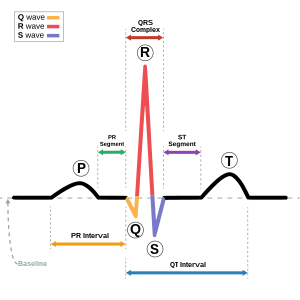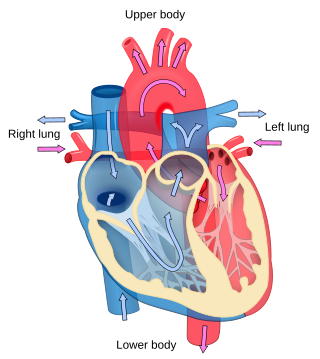
Cardiology is the study of the heart. Cardiology is a branch of medicine that deals with disorders of the heart and the cardiovascular system. The field includes medical diagnosis and treatment of congenital heart defects, coronary artery disease, heart failure, valvular heart disease, and electrophysiology. Physicians who specialize in this field of medicine are called cardiologists, a specialty of internal medicine. Pediatric cardiologists are pediatricians who specialize in cardiology. Physicians who specialize in cardiac surgery are called cardiothoracic surgeons or cardiac surgeons, a specialty of general surgery.

Catheter ablation is a procedure that uses radio-frequency energy or other sources to terminate or modify a faulty electrical pathway from sections of the heart of those who are prone to developing cardiac arrhythmias such as atrial fibrillation, atrial flutter and Wolff-Parkinson-White syndrome. If not controlled, such arrhythmias increase the risk of ventricular fibrillation and sudden cardiac arrest. The ablation procedure can be classified by energy source: radiofrequency ablation and cryoablation.
Clinical cardiac electrophysiology, is a branch of the medical specialty of cardiology concerned with the study and treatment of rhythm disorders of the heart. Cardiologists with expertise in this area are usually referred to as electrophysiologists. Electrophysiologists are trained in the mechanism, function, and performance of the electrical activities of the heart. Electrophysiologists work closely with other cardiologists and cardiac surgeons to assist or guide therapy for heart rhythm disturbances (arrhythmias). They are trained to perform interventional and surgical procedures to treat cardiac arrhythmia.
An accessory pathway is an additional electrical connection between two parts of the heart. These pathways can lead to abnormal heart rhythms or arrhythmias associated with symptoms of palpitations. Some pathways may activate a region of ventricular muscle earlier than would normally occur, referred to as pre-excitation, and this may be seen on an electrocardiogram. The combination of an accessory pathway that causes pre-excitation with arrhythmias is known as Wolff-Parkinson-White syndrome.

Amiran Shota Revishvili, born February 11, 1956, is a cardiac electrophysiologist, and Director, A.V. Vishnevsky Institute of Surgery in Moscow. He is president of the Russian Scientific Society of Clinical Electrophysiology, Arrhythmology and Cardiac Pacing, which is the Russian organizational member of the European Heart Rhythm Society network.
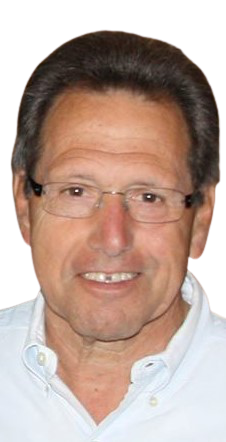
Mark E. Josephson (1943-2017) was an American cardiologist and writer, who was in the 1970s one of the American pioneers of the medical cardiology subspecialty of cardiac electrophysiology. His book titled Clinical Cardiac Electrophysiology: Techniques and Interpretations is widely acknowledged as the definitive treatment of the discipline. He served as Herman Dana Professor of Medicine at Harvard Medical School, director of the Harvard-Thorndike Electrophysiology Institute and Arrhythmia Service and the chief of cardiology at Harvard University's Beth Israel Deaconess Medical Center in Boston.

The European Society of Cardiology (ESC) is an independent non-profit, non-governmental professional association that works to advance the prevention, diagnosis and management of diseases of the heart and blood vessels, and improve scientific understanding of the heart and vascular system. This is done by:

Michel Haïssaguerre is a French cardiologist and electrophysiologist. His investigations have been the basis for development of new markers and therapies for atrial and ventricular fibrillation.
Morton Maimon Mower was an American cardiologist specializing in electrophysiology and the co-inventor of the automatic implantable cardioverter defibrillator. He served in several professional capacities at Sinai Hospital and Cardiac Pacemakers Inc. In 1996, he became the chairman and chief executive officer of Mower Research Associates. He was inducted into the National Inventors Hall of Fame in 2002 for the development of the automatic implantable cardioverter defibrillator with Michel Mirowski in the 1970s. He continued his research in the biomechanical engineering laboratories at Johns Hopkins University.
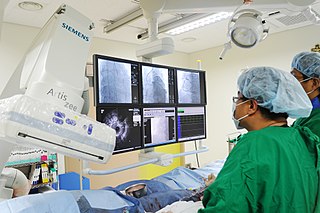
A cardiac electrophysiology study is a minimally invasive procedure using catheters introduced through a vein or artery to record electrical activity from within the heart. This electrical activity is recorded when the heart is in a normal rhythm to assess the conduction system of the heart and to look for additional electrical connections, and during any abnormal heart rhythms that can be induced. EP studies are used to investigate the cause, location of origin, and best treatment for various abnormal heart rhythms, and are often followed by a catheter ablation during the same procedure.
A wearable cardioverter defibrillator (WCD) is a non-invasive, external device for patients at risk of sudden cardiac arrest (SCA). It allows physicians time to assess their patient's arrhythmic risk and see if their ejection fraction improves before determining the next steps in patient care. It is a leased device. A summary of the device, its technology and indications was published in 2017 and reviewed by the EHRA Scientific Documents Committee.

Henrick Joan Joost Wellens, M.D., (1935–2020) was a Dutch cardiologist who is considered one of the founding fathers of clinical cardiac electrophysiology - a discipline which enables patients with cardiac arrhythmias to have catheter electrode mapping and ablation.
Andrea Natale is an Italian-born American cardiologist and electrophysiologist, i.e. a heart rhythm specialist. Natale is known for his work in atrial fibrillation ablation, and he is currently the executive director at the Texas Cardiac Arrhythmia Institute.
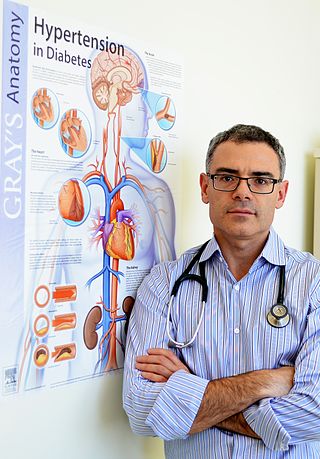
Yaariv Khaykin is a Canadian cardiologist and a clinical researcher in the area of electrophysiology. He is the director of the Newmarket Electrophysiology Research Group at the Southlake Regional Health Centre. He has published research into complex ablation and pioneered cardiac ablation methods.

Charles Antzelevitch is an American cardiovascular research scientist in the fields of cardiac electrophysiology and cardiac arrhythmia syndromes.
Gan-Xin Yan is an American cardiologist, electrophysiologist and cardiovascular research scientist whose studies of arrhythmias have contributed to an understanding of J wave syndromes, long QT syndrome, and other abnormalities that can lead to sudden cardiac death. Yan is a professor at Lankenau Institute for Medical Research (LIMR) and a practicing cardiologist and electrophysiologist at Lankenau Medical Center, both located in Wynnewood, Pennsylvania. He also holds positions as professor of medicine at Sidney Kimmel Medical College of Thomas Jefferson University in Philadelphia and Xi'an Jiaotong University in Xi'an, Shaanxi, China.
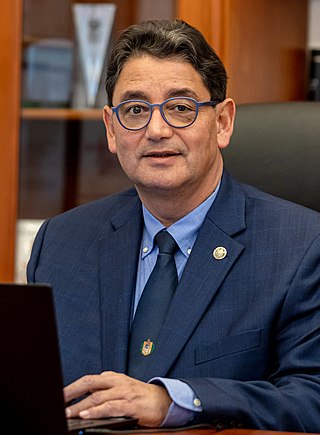
Dr. Béla Merkely is a Hungarian interventional cardiologist and sports cardiologist, a university professor, director of Semmelweis University's Heart and Vascular Centre and the current rector of Semmelweis University since 1 July 2018.
Bruce B. Lerman is a cardiologist. He is the Hilda Altschul Master Professor of Medicine at Weill Cornell Medical College, and was chief of the Division of Cardiology and director of the Cardiac Electrophysiology Laboratory at Weill Cornell Medicine and the New York Presbyterian Hospital.
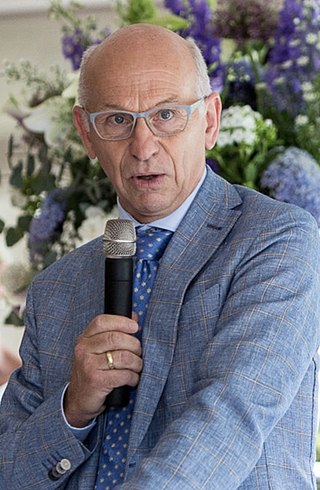
Frits F.W. Prinzen is an expert on cardiac pacing therapies, both for bradycardia and for heart failure.

Günter Breithardt is a German physician, cardiologist and emeritus university professor. He is known for his research in the field of rhythmology, especially the diagnosis and pharmacological and non-pharmacological therapy of cardiac arrhythmias and acute cardiac death, in particular the identification of arrhythmia-triggering gene mutations. For 21 years he headed the Medical Clinic and Polyclinic C at Münster University Hospital. A number of his academic students hold university management and chief physician positions.
